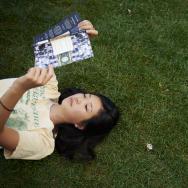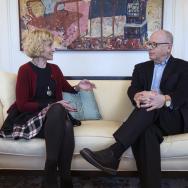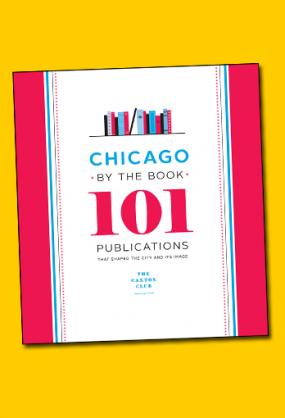How can a city be summed up in books? That’s the question that Chicago By the Book, published earlier this year by the University of Chicago Press, tries to answer. The volume profiles 101 written works deemed crucial to the formation of Chicago’s reputation—with essays about the books from writers, academics and others connected to the city.
The Caxton Club, a bibliophilic society founded in 1895, formed an eight-member committee that included UChicago Prof. Emeritus Neil Harris to debate what made for an essential book: A Chicago author? A Chicago setting? Or a Chicago story?
The final list features everything from Upton Sinclair’s The Jungle, to Carl Sandburg’s Chicago Poems, to the seminal 1945 book Black Metropolis: A Study of Negro Life in a Northern City. The collection also features numerous connections to UChicago through both the subject matter of the books, and those selected to write essays about their importance—including Dean John W. Boyer, Prof. Andrew Abbott and Prof. Rosanna Warren.
“The University of Chicago is one of the city’s historical links to a world reputation,” said Harris, the Preston & Sterling Morton Professor Emeritus of U.S. History and Art History, who wrote the introduction and a number of the essays. “There was no plan, as it were, to make the University into a central part of the book. It’s not a central part, but it’s a recurrent pattern.”
Below are a few of the publications featured in Chicago by the Book, along with excerpts from the accompanying essays:
The School and Society: Being Three Lectures
John Dewey, 1899
“The School and Society helped put the institution and Chicago at the center of the educational-reform universe. It also punctuated Dewey’s shift from the metaphysical preoccupations of his early career to the socially engaged outlook that made him a giant in the spheres of pragmatist philosophy, education, and politics over the next half century.”
—Michael P. Wakeford, PhD’14, associate professor at UNC School of the Arts
Chimes
Robert Herrick, 1926
“Chimes is a novel set in the University of Chicago’s earliest years. … The founding president behaves like Chicago’s builders and rulers; the professors, with a few exemplary exceptions, behave as do the professional men of the city, giving way to the same temptations. They too strive for social advancement and material goals at variance with the integrity of their calling; they too succumb to the petty and unlovely enticements of the commercial world around them. In the end, the university that Herrick wished were an ivory tower is instead a microcosm, and indeed a creature, of Chicago itself.”
—Hanna Holborn Gray, former president of the University of Chicago
Touchdown!
Told by Amos Alonzo Stagg to Wesley Winans Stout, 1927
“The university founding president, William Rainey Harper, used Stagg and football as an early promotional tool. As a result, the coach created the nation’s model for industrial-strength college football, prompting the rise of the roles of coaches, players, and spectators. … At age sixty-five, the ‘Grand Old Man’ related his memoirs to Wesley Winans Stout, a newspaper reporter in his thirties who had just been hired at the Saturday Evening Post.”
—Robin Lester, MAT'66, PhD’74
The Adventures of Augie March
Saul Bellow, X’39, 1953
“Chicago is so vivid in Augie March partly because Augie himself is not. An older Augie narrates the novel in rich, cascading, allusion-packed language, language that does not yet belong to the boy and young man he is recalling. … But he described Chicago as well as anyone ever has.”
—David Auburn, AB’91, Pulitzer-winning playwright
Atoms in the Family: My Life with Enrico Fermi
Laura Fermi, 1954
“The Fermis and many of their immigrant colleagues had become American citizens, but the foreign origin of numerous key Manhattan Project scientists was the focus of ongoing postwar political suspicion. Seeking to broaden public understanding of nuclear scientists and their work, the University of Chicago Press asked Laura to write a biography of her life with Enrico.”
—Daniel Meyer, UChicago Director of Special Collections and University Archivist


